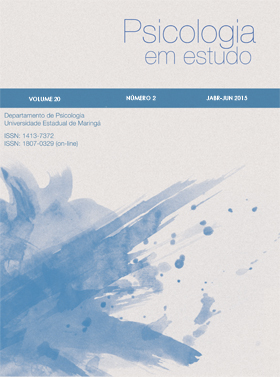GROUP COORDINATION IN A MENTAL HEALTH CARE INTERVENTION: COMMUNITY MENTAL HEALTH GROUP
Abstract
The Community Mental Health Group (CMHG) is a mental health care promotion program, open to the community and inspired by the goals of Psychiatric Reform. The group has been developed over more than 23 years, through its practice, systematic observation and research. This study aimed to understand the role of the group coordinator within this group modality. The corpus of the research was constituted from six audio-recorded group sessions and transcribed in full. An original analysis was outlined in which all the coordinator's interventions were described, analysed and contextualized concerning the moment and development of the group session. Common axes have been identified, which characterize the interventions: ‘The framework in the Community Mental Health Group’, ‘The look at the human gesture in the contributions’, and ‘Coordinator's personal participation’. It was observed that the CMGH's coordination is related to the proposal of the activity and its theoretical, philosophical and empirical foundation, inspired by Classical Phenomenology. The framework, interventions and coordinator's participation appeared to foster the creation of an intersubjective care space, from a horizontal perspective, based on the task of recognizing significant daily experiences in the human being's maturing path. In this sense, this research highlights the relevance of the in-depth study of group practices’ aspects, such as group coordination, as a way of better describing and understanding them.
Downloads
References
Alves, P. E. R. (2013). O método fenomenológico na condução de grupos terapêuticos. Revista Sociedade Brasileira de Psicologia Hospitalar, 16(1), 150-165.
Bernard, H.; Burlingame, G.; Flores, P.; Greene, L.; Joyce, Na.; Kobos, J. C. et al. (2008). Clinical Practice Guideline for Group Psychotherapy. International Journal of Group Psychotherapy, 58(4), 455-542.
Brasil (2005). Reforma psiquiátrica e política de saúde mental no Brasil. Brasília: Ministério da Saúde.
Cantarella, A., Borella, E., Marigo, C., & De Beni, R. (2017). Benefits of well‐being training in healthy older adults. Applied Psychology: Health and Well-Being, 9(3), 261-284.
Crovador, L.F. (2012). Encontro Comunitário de Saúde Mental: um estudo fenomenológico. Dissertação de Mestrado, Faculdade de Filosofia, Ciências e Letras de Ribeirão Preto, Universidade de São Paulo, Ribeirão Preto.
Davidson, L. (2017).After the Asylum: a basaglian-informed vision of recovery-oriented care. Cadernos Brasileiros de Saúde Mental, 9(21), 125-136.
Dies, R. R. (1994). Therapist Variables in Group Psychotherapy Research. In: A. Fuhriman & G. M. Burlingame (Orgs). Handbook of Group Psychotherapy: An Empirical and Clinical Synthesis. New York: John Wiley & Sons.
Ishara, S. & Cardoso, C. L. (2013). Delineamento do Grupo comunitário de Saúde Mental. In: S. Ishara; C. L. Cardoso & S. Loureiro (Org). Grupo Comunitário de Saúde Mental: conceitos, delineamento metodológico e estudos (pp. 19-40). Ribeirão Preto: Nova Enfim Editora
Lieberman, M. A.; Yalom, I. D. & Miles, M. B. (1973). Encounter Groups: First Facts. New York: Basic Books, Inc., Publishers.
McFarlane, E., Burrell, L., Duggan, A., & Tandon, D. (2017). Outcomes of a randomized trial of a cognitive behavioral enhancement to address maternal distress in home visited mothers. Maternal and Child Health Journal, 21(3), 475-484.
Nogueira A. L. G., Munari, D. B., Fortuna, C. M., Santos, L. F. (2016). Pistas para potencializar grupos na Atenção Primária à Saúde. Revista Brasileira de Enfermagem, 69(5), 907-914.
Pinheiro, B. C. (2017). Grupo Comunitário de Saúde Mental: formação de recursos humanos. Dissertação de Mestrado, Faculdade de Filosofia, Ciências e Letras de Ribeirão Preto, Universidade de São Paulo, Ribeirão Preto.
Rasera, Oliveira e Jesus (2014). A prática grupal e o discurso sobre a ética em documentos oficiais. Estudos de Psicologia (Campinas), 31(3), 405-414.
Rocha, R. M. G. (2015). Análise Compreensiva de uma nova modalidade de trabalho em saúde: o Grupo Comunitário de Saúde Mental. Tese de Doutorado, Faculdade de Filosofia, Ciências e Letras de Ribeirão Preto, Universidade de São Paulo, Ribeirão Preto
Safra, G. (2005/2015). A face estética do Self: teoria e clínica (7ª Ed.). São Paulo: Ideias&Letras.
Scheidlinger, S. (2004). Group Psychotherapy and Related Helping Groups Today: an Overview. American Journal of Psychotherapy, 58(3), 265-280.
Shay, J. J. (2017). Contemporary Models of Group Therapy: where are we today?. International Journal of Group Psychotherapy, 67(1), S7-S12.
Silva, G., Iglesias, A., Dalbello-Araújo, M., & Badaró-Moreira, M. I. (2017). Práticas de Cuidado Integral às Pessoas em Sofrimento Mental na Atenção Básica. Psicologia: Ciência e Profissão, 37(2), 404-417.
Silva, N. L. & Cardoso, C. L. (2016). Cuidado em saúde mental na Estratégia Saúde da Família: a construção da comunidade. Memorandum, 31, 218-236.
Trapé & Onocko (2017). Modelo de atenção à saúde mental do Brasil: análise do financiamento, governança e mecanismos de avaliação. Revista de Saúde Pública, 51 (19), 1-8.
Zlotnick, C., Tzilos, G., Miller, I., Seifer, R., & Stout, R. (2016). Randomized controlled trial to prevent postpartum depression in mothers on public assistance. Journal of Affective Disorders, 189, 263-268.
Copyright (c) 2020 Psicologia em Estudo

This work is licensed under a Creative Commons Attribution-NonCommercial 4.0 International License.
As opiniões emitidas, são de exclusiva responsabilidade do(s) autor(es). Ao submeterem o manuscrito ao Conselho Editorial de Psicologia em Estudo, o(s) autor(es) assume(m) a responsabilidade de não ter previamente publicado ou submetido o mesmo manuscrito por outro periódico. Em caso de autoria múltipla, o manuscrito deve vir acompanhado de autorização assinada por todos os autores. Artigos aceitos para publicação passam a ser propriedade da revista, podendo ser remixados e reaproveitados conforme prevê a licença Creative Commons CC-BY.
The opinions expressed are the sole responsibility of the author (s). When submitting the manuscript to the Editorial Board of Study Psychology, the author (s) assumes responsibility for not having previously published or submitted the same manuscript by another journal. In case of multiple authorship, the manuscript must be accompanied by an authorization signed by all authors. Articles accepted for publication become the property of the journal, and can be remixed and reused as provided for in theby a license Creative Commons CC-BY.
















